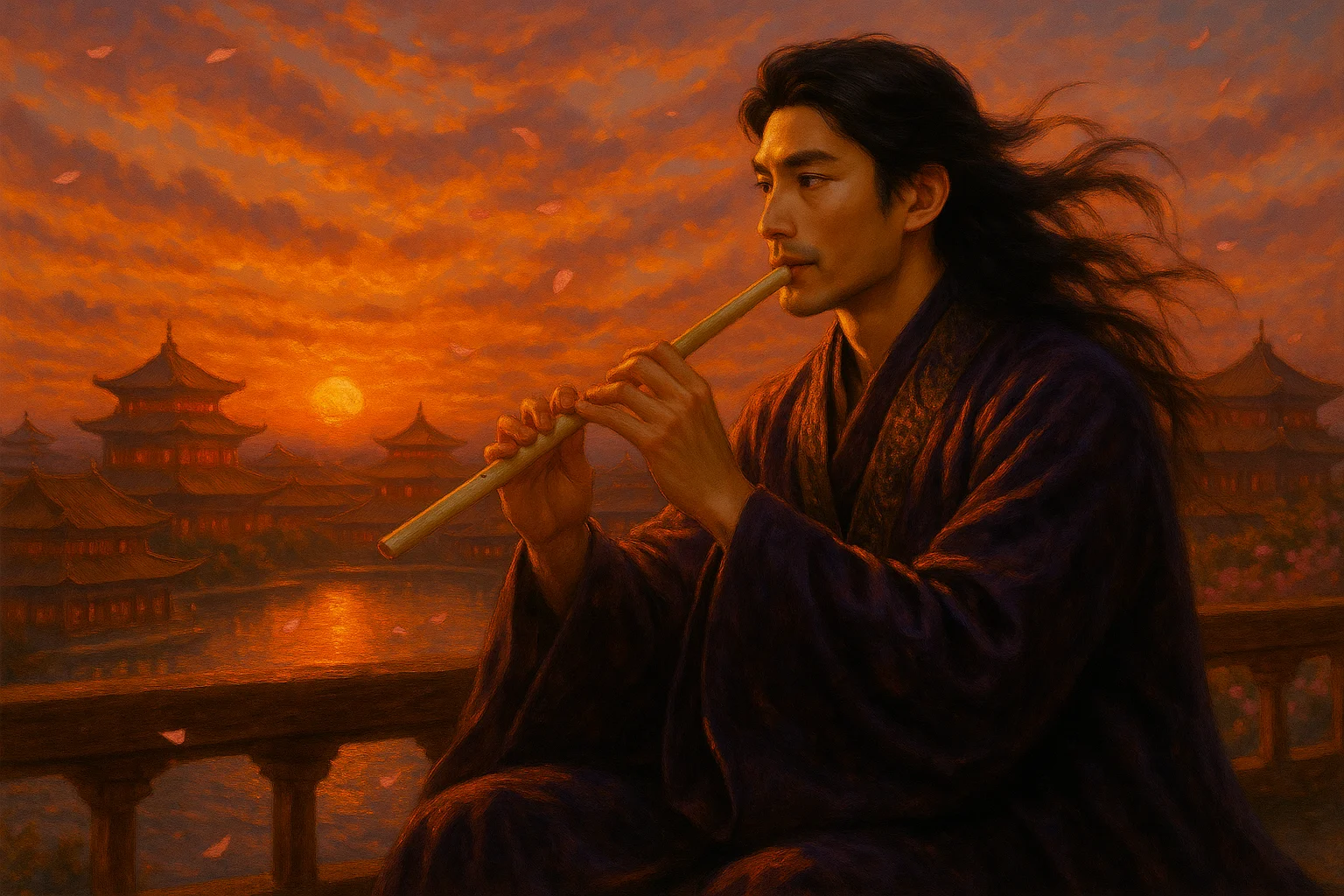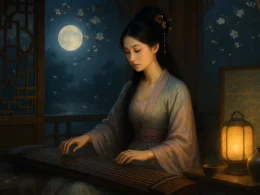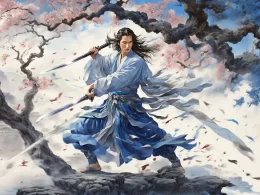When swallows are ready to go,
Last night the west wind blew on the tower high.
We’ve managed to meet on earth below,
And drink by chrysanthemums with cup of gold.
Long songs we sing with faces rosy and bold.
The setting sun peeps through the screen;
A light chill penetrates plane trees green.
How many feelings can’t be told
Are written in the song on paper fine.
This feeling weighs thousands of tons in my mind.
Original Poem
「破阵子 · 燕子欲归时节」
燕子欲归时节,高楼昨夜西风。
求得人间成小会,试把金尊傍菊丛。歌长粉面红。斜日更穿帘幕,微凉渐入梧桐。
晏殊
多少襟情言不尽,写向蛮笺曲调中。此情千万重。
Interpretation
This lyric was composed during Yan Shu's later years in the mid-Northern Song Dynasty. Though having attained high office and great renown, the aging poet carried a quiet melancholy within, his style maturing into profound subtlety after witnessing life's vicissitudes. Written in autumn—perhaps inspired by a banquet or autumn scenery—it expresses not just conventional parting sorrow but the poet's own deeply buried loneliness and remembrance.
While traditionally interpreted as the poet channeling a songstress's feelings after an autumn rendezvous, the poem contains no explicit identification of its speaker nor any vulgar sentiment—only exquisite emotional depth. As noted by critic Ye Jiaying: "Though employing romantic imagery, it maintains essential dignity." Thus while depicting tender attachment, the work elevates romantic longing into refined meditation on profound human connections.
First Stanza: "燕子欲归时节,高楼昨夜西风。求得人间成小会,试把金尊傍菊丛。歌长粉面红。"
Yànzi yù guī shíjié, gāolóu zuóyè xīfēng. Qiú dé rénjiān chéng xiǎo huì, shì bǎ jīn zūn bàng jú cóng. Gē cháng fěnmiàn hóng.
When swallows prepare their seasonal departure, / As last night's west wind swept the tower— / Having secured this brief earthly meeting, / She raises her golden cup by chrysanthemum clusters, / Singing long ballads, her powdered cheeks flushed.
The autumn gathering unfolds with seasonal symbolism—migrating swallows and tower-borne winds foreshadow imminent separation. The woman's golden cup amid chrysanthemums (autumnal symbols of resilience) creates a visually striking scene, while "flushed cheeks" artfully blend wine's warmth, singing's passion, and autumn's glow into a singular radiant moment.
Second Stanza: "斜日更穿帘幕,微凉渐入梧桐。多少襟情言不尽,写向蛮笺曲调中。此情千万重。"
Xié rì gèng chuān liánmù, wēi liáng jiàn rù wútóng. Duōshǎo jīn qíng yán bù jìn, xiě xiàng mán jiān qǔdiào zhōng. Cǐ qíng qiānwàn chóng.
The slanting sun pierces curtains now, / As creeping chill permeates wutong leaves. / Countless heart-messages defy speech— / They flow into ornate paper and song melodies. / This feeling weighs a thousand tons.
Transitioning from light to emotion, the stanza uses penetrating sunlight and infiltrating chill to mirror deepening sentiment. The wutong tree (traditional symbol of autumn sorrow) receives this "creeping chill"—an exquisite metaphor for love's quiet ache. When words fail, music and poetry become vessels for the unspeakable, culminating in the crushing weight of "a thousand tons"—Yan Shu's masterful compression of infinite feeling into measurable immensity.
Holistic Appreciation
This lyric poem unfolds through a feminine perspective, yet subtly projects the poet's own emotions with graceful restraint. The first stanza depicts joyful reunion while the second expresses parting sorrow - calm on the surface yet turbulent beneath. Though the word "parting" never appears, images like "homecoming time," "west wind," "slanting sunlight" and "slight chill" progressively build an autumnal atmosphere of impermanent meetings and irretrievable affections.
Yan Shu masterfully employs scenery to convey emotion, using nature to reflect feelings. He paints a vivid psychological portrait of a woman - her delicate beauty, deep affection and quiet loneliness - while simultaneously externalizing his own emotional state. This dual perspective demonstrates the artistic heights achieved through his late-life experiences and emotional maturity.
Artistic Merits
The poem's ingenious conception uses seasonal imagery - "swallows," "west wind," "chrysanthemum clusters," "slanting sun" - to establish temporal and spatial atmosphere before advancing the emotional narrative through "rosy powdered face," "melodic tunes" and "countless layers." The refined language conveys profound sentiment through subtlety rather than direct expression, exemplifying what Ye Jiaying praised as "romantic diction that ultimately maintains dignity."
With concise phrasing and brisk rhythm, the poem embeds emotion within lines and meaning beyond words, achieving both visual beauty and psychological depth. It stands as an exquisite example of the graceful restrained style where emotion and artistry perfectly converge.
Insights
This work demonstrates the supreme expressive power of Chinese classical poetry to "use scenery to衬托 emotion" and "borrow objects to convey feeling." Life's meetings and partings remain unpredictable; affection persists even as separation comes. The most moving poetry rarely declares love or pain directly, but rather plants deep emotion within natural imagery and everyday scenes. With his characteristically mellow brushwork, Yan Shu renders this parting sorrow with an elegance free of pathos and a moving quality devoid of vulgarity - precisely where literature's most soul-stirring power resides.
Poem Translator
Xu Yuanchong (许渊冲)
About the Poet

Yan Shu (晏殊 991 – 1055) Originaire de Fuzhou dans le Jiangxi, Yan Shu fut le maître fondateur de l'école wanyue (élégante et retenue) de la poésie ci sous les Song du Nord. Enfant prodige entré dans l'administration à quatorze ans, ses ci allient noblesse classique et méditation philosophique dissimulée sous des évocations de prospérité raffinée. Mentor de talents comme Fan Zhongyan et Ouyang Xiu, il initia l'École du Jiangxi en poésie ci et posa les bases de l'épuration du genre sous les Song.












